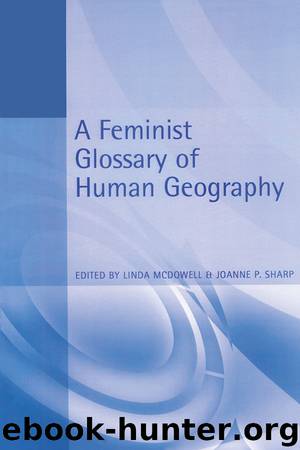Feminist Glossary of Human Geography by Sharp Joanne; McDowell Linda;

Author:Sharp, Joanne; McDowell, Linda;
Language: eng
Format: epub
Publisher: Taylor and Francis
SOCIAL CONSTRUCTIONISTS point out that to see HETEROSEXUALITY as natural implies it is given, while other sexualities require a (distorted) process of PRODUCTION. Psychoanalysis, of course, has always seen all forms of sexuality as developmentally produced (Sayers, 1986). Constructionists believe that all sexualities are constructed within discourse – and so is the notion of naturality itself (Richardson, 1996). QUEER THEORY rejects not only normative heterosexuality but also the naturalising of gay, lesbian and BISEXUAL identities, and the allocation of SEXUALITY to such fixed categories in the first place. Although Foucault’s later work refers to the natural BODY as the site of cultural inscriptions (Sawicki, 1991: 67), strong social constructionists also deny the naturalness of bodies (Butler, 1993, 1995). For them, the ‘natural’ is invented within culture and then used to impose certain conventions. Such a thoroughgoing denial of the natural arguably has drawbacks. It means we cannot distinguish between things which are entirely artefacts of culture and those which, like bodies, have extra-discursive features given meaning, worked on and transformed by cultural practices. CN
Nature A deeply ambiguous and resonant term, the many contested meanings of which have political implications (Harvey, 1996: 118). Everyday meanings in Western cultures include wilderness, that is, parts of the earth free of human presence and apparently of its effects. There is arguably no longer any wilderness in that full sense, and much of what is enjoyed as such is conserved and managed. The term is also used to refer to the countryside, to rural as opposed to urban localities. Here nature means not only what is green and alive, but even by extension ways of life governed by the rhythms of the seasons and by biological necessity. Past or rural cultures can be included in nature when it is understood as the origin, as the state of affairs preceding human action and furnishing its raw material. Usually, things which do not owe their existence to deliberate human activity are seen as part of nature, in contrast to human manufactured products and the associated waste. Nature has always been personified, usually as a female figure or MOTHER, and the idea of Nature as an order with moral implications is still current in such phrases as ‘That’s against nature’. All these common meanings depend on some form of opposition of nature to humanity, so that animals, plants and other life forms are part of nature, and so are non-sentient features of the planet, whereas humans and human culture are wholly or partially non-natural. In What is Nature? Kate Soper argues that the ‘OTHERNESS’ of nature is fundamental to this highly unstable concept. Changes in the idea of nature, she argues, reflect changes in dominant ideas of what it is to be human. Partially or completely socially excluded groups are always seen by dominant groups as ‘closer to nature’ – for example ‘barbarians’, women, ‘idiots’, black people (Soper, 1995: 74). Here too humans and human cultures can be included in nature, because they are seen as not fully human or are seen as ‘uncivilised’, so not genuinely acculturated.
Download
This site does not store any files on its server. We only index and link to content provided by other sites. Please contact the content providers to delete copyright contents if any and email us, we'll remove relevant links or contents immediately.
A Dictionary of Sociology by Unknown(2871)
The Art of Dramatic Writing: Its Basis in the Creative Interpretation of Human Motives by Egri Lajos(2869)
The Dictionary of Body Language by Joe Navarro(2844)
0041152001443424520 .pdf by Unknown(2641)
How The Mind Works by Steven Pinker(2639)
Day by Elie Wiesel(2618)
Merriam-Webster's Collegiate Thesaurus, Second Edition by Merriam-Webster Inc(2605)
The Meaning of the Library by unknow(2408)
The Official Guide to the TOEFL Test by ETS(2240)
A History of Warfare by John Keegan(2117)
The Emotion Thesaurus: A Writer's Guide to Character Expression by Puglisi Becca & Ackerman Angela(2087)
Emotion Amplifiers by Angela Ackerman & Becca Puglisi(1966)
MASTER LISTS FOR WRITERS: Thesauruses, Plots, Character Traits, Names, and More by Bryn Donovan(1869)
The Cambridge Guide to English Usage by PAM PETERS(1839)
Merriam-Webster's Pocket Dictionary by Merriam-Webster(1825)
Star Wars The Rise of Skywalker The Visual Dictionary by Pablo Hidalgo(1768)
Lucky Jim by Kingsley Amis(1656)
American Accent Training by Ann Cook(1581)
Word by Word by Kory Stamper(1579)
